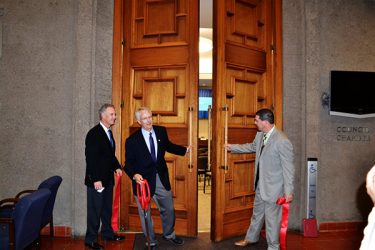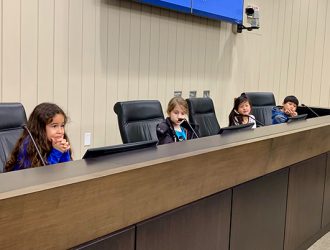This is one of a series of reflections I plan to write as I wind up my almost twenty year stint as a local elected official. The goal is simple: share things I’ve learned, or think I’ve learned, which I didn’t know before I began that journey. Which will, hopefully, make the interactions of my fellow residents with government more effective and more comprehensible. Because I’ve noticed there’s a lot of confusion out there about how government operates ????!
We all share a framework for dealing with competing demands in social situations. One of the most important ideas is simple: first come, first served. It’s used a lot in communities as a means of keeping group behaviors from descending into chaos. Can you imagine what would happen if everyone wanting to buy their groceries at Bianchinni’s fought over who got to be served next by a cashier? There’d be riots every day…and, ultimately, no one would be able to get the food they need. Instead, we all (mostly) tacitly agree to let those who show up first get served first.
Of course, we all experience exceptions to this, with people cutting in line, etc. Part of the reason we remember those exceptions is because they are violations of a key social norm. Years ago Barbara & I were waiting in line at a movie theater when a young man and his date approached us and asked if it was okay if they got in line in front of us (it was a very long line). I told him, “No. But I’m fine if you get in line right behind me if it’s okay with the folks behind us.” He then asked the next couple the exact same question and got the exact same answer. At which point he said “I see how this is working” and went to the end of the line.
First come, first served is a deep-seated and critical part of social interactions…yet it has little relevance to the way the law works.
That begs the question, though. If it’s such a widely employed behavioral rule, why isn’t it part of our legal framework?
The reason it doesn’t specifically exist in the law is because it conflicts with a fundamental principle of our legal system: we want the law to apply equally to everyone. That’s such an important tenet we’ve embedded it in our Constitution. Admittedly, it wasn’t clear enough in the original document and had to be added as the 14th Amendment. After we fought a war and killed nearly a million community members because we disagreed about what we wanted “equal before the law” to mean. Here’s the text of the Amendment:
Section 1. All persons born or naturalized in the United States, and subject to the jurisdiction thereof, are citizens of the United States and of the State wherein they reside. No State shall make or enforce any law which shall abridge the privileges or immunities of citizens of the United States; nor shall any State deprive any person of life, liberty, or property, without due process of law; nor deny to any person within its jurisdiction the equal protection of the laws.
Section 2. Representatives shall be apportioned among the several States according to their respective numbers, counting the whole number of persons in each State, excluding Indians not taxed. But when the right to vote at any election for the choice of electors for President and Vice President of the United States, Representatives in Congress, the Executive and Judicial officers of a State, or the members of the Legislature thereof, is denied to any of the male inhabitants of such State, being twenty-one years of age, and citizens of the United States, or in any way abridged, except for participation in rebellion, or other crime, the basis of representation therein shall be reduced in the proportion which the number of such male citizens shall bear to the whole number of male citizens twenty-one years of age in such State.
Section 3. No person shall be a Senator or Representative in Congress, or elector of President and Vice President, or hold any office, civil or military, under the United States, or under any State, who, having previously taken an oath, as a member of Congress, or as an officer of the United States, or as a member of any State legislature, or as an executive or judicial officer of any State, to support the Constitution of the United States, shall have engaged in insurrection or rebellion against the same, or given aid or comfort to the enemies thereof. But Congress may, by a vote of two-thirds of each House, remove such disability.
Section 4. The validity of the public debt of the United States, authorized by law, including debts incurred for payment of pensions and bounties for services in suppressing insurrection or rebellion, shall not be questioned. But neither the United States nor any State shall assume or pay any debt or obligation incurred in aid of insurrection or rebellion against the United States, or any claim for the loss or emancipation of any slave; but all such debts, obligations and claims shall be held illegal and void.
Section 5. The Congress shall have power to enforce, by appropriate legislation, the provisions of this article
It’s worth reading the Wikipedia article to learn more about the history of the 14th Amendment. It’s a fascinating story!
While the impetus behind the 14th Amendment had to do with rectifying the evils of slavery it also enshrined the notion that we are all equal before the law. Much of the “legality” of slavery was based on the notion the law could apply differently to different people, depending on what the community decided (particularly if the community simply declared some people simply weren’t human like the “real” members of the community). The 14th Amendment was written broadly to make it very clear the United States would be committed to equality before the law1.
But just how is equality before the law in conflict with “first come, first served”? Let’s look at an example that comes up all the time on the local level.
I frequently get contacted by residents upset because a bigger home is planned to be built next door. The writers generally demand the Council do something to stop this and see any unwillingness to do so as a sure sign the Council is corrupt, in league with developers and/or has been paid off2.
The reality is more mundane: the law itself does not allow the Council to protect a longer-term property owner at the expense of a newcomer. We must treat each the same. Not in the specific outcome – we can’t force a property owner to build a duplicate of a home they want to tear down or one that looks like the adjacent homes – but in how we regulate each property owner’s behavior.
We do that by applying the same rules to both property owners. If the newcomer wants to build a two-story home where a single-story one existed it’s only possible because the longer-term property owner can also build a two-story home if they wanted to. In most cases, of course, the longer-term property owner is happy with what they own and doesn’t want to rebuild it. But they could. Because they have the same rights as the newcomer.
What both the longer-term owner and the Council can’t do is interfere with the newcomer’s pursuit of those community-granted rights. Because that would violate the principle of equal treatment under the law.
That adjective “community-granted” is important. While some rights are inherent (e.g., freedom of speech, freedom to own a firearm) many others are granted by or maintained by the community. Property rights fall into the latter category and can be changed by the community, with some limitations.
I once had an interesting conversation with our planning staff and city attorney about this. I asked them, hypothetically, if the Council could adopt a regulation prohibiting the construction of anything other than single-story homes in San Carlos. There was a long pause…after which they said “Yes. But please don’t suggest that.”
Such a change, even if adopted, would not require anyone to tear down a two-story home. That kind of adjustment would be considered an unlawful taking of property, in this case the second floor of a privately-owned building. There is another part of the law (actually part of our over-arching constitutional framework) which forbids such actions unless the community provides fair compensation for the taking.
The reason staff appended that plea to their answer is because they believe – and I do, too – such a restriction would seriously harm San Carlos over the long run. Among other things, as pleasant as it might be to never have to worry about a bigger home being built next door, I believe it would make San Carlos a much less attractive market for home buyers. Which would translate into lower home values, adversely impacting the financial situation of every homeowner in our community. No, thanx.
But it is an example of the kinds of choices communities can make should they or their elected representatives be so inclined. In fact, a group of residents pushed for restrictions on the size of new homes several years ago. After a long public process the Council unanimously adopted some additional restrictions on home sizes. It was a good example of how the political process works3.
Perhaps a simpler way to understand why the law doesn’t allow communities to apply “first come, first served” logic is this: government’s primary focus is not on individuals but on the interactions among and between individuals. If I live by myself on an island in the middle of the Pacific there would be no need for government. But as soon as you introduce multiple independent individuals you need some form of government. Humans are too smart, too manipulative and too self-interested for them to live together in natural harmony. That’s particularly so when they’re not part of the same family or tribe4.
Once you create an institution for defining regulations, a government, you inevitably face the question of how the rules get applied to community members. Do I get special treatment because, say, I make the rules? Welcome to monarchy! Do some of us get special treatment because we can kick the butts of the rest of you if you don’t accord us special treatment? Welcome to military dictatorship! The list of possible governmental forms is long, with each one implying different degrees to which “first come, first served” can apply in its legal framework.
But if you want a free society we pretty much have to agree to treat each other equally. Or at least have the goal of doing so, and fight constantly over whether or not we’re actually achieving our aim. That’s the path we’ve taken, so far at least.
Once you do that, first come, first served goes out the window. Leading to on-going confusion…and, on balance, in my opinion, a better world for everyone.
But even then some of us skirted the Constitutional requirement for almost a century, and to some extent are still indulging in such anti-community behavior today. But that’s a tale for a different post. ↩
It’s certainly the case political corruption exists. Moreover, since the political process involves parties jockeying for the ear of the Council those who are better-heeled and/or more experienced in lobbying can have an edge in the debate. On the other hand all electeds have to stand before the public for re-election, where the power of lobbyists is much diminished. There are also numerous laws, with significant personal and financial penalties, in place to guard against just such types of anti-community behavior. So corruption is nowhere near as common as is often assumed to be the case. ↩
Although the Council also unanimously chose not to adopt the proposal that had been presented to it. This disappointed the original proponents. What I’ve reminded them is that no restrictions would’ve been forthcoming without their efforts. It just wasn’t on the Council’s radar. ↩
Although all families squabble over their own rules and tribalism evolved, I suspect, in part as a form of “built-in” government because while individual humans are pretty puny animals, communities of them are formidable. But the evolutionary advantage of community can only be realized if there’s some mechanism to mediate interpersonal conflict. Presto, tribalism! And, later, government. ↩




























